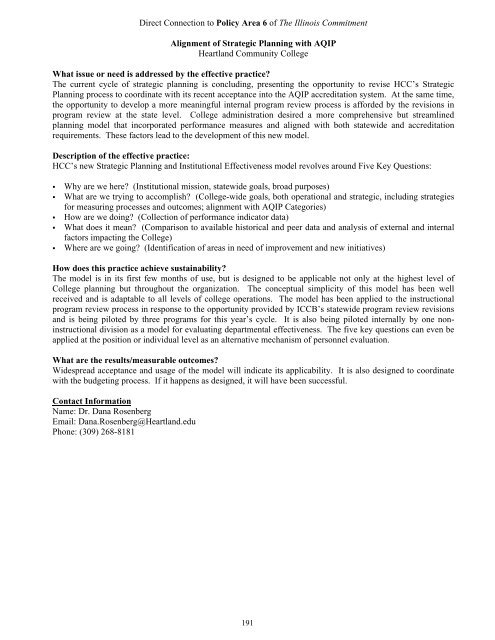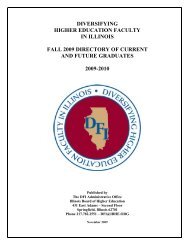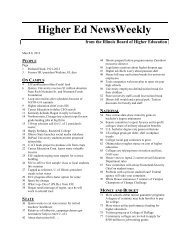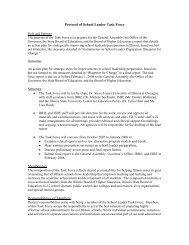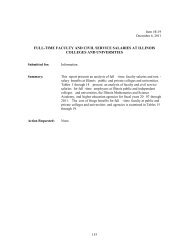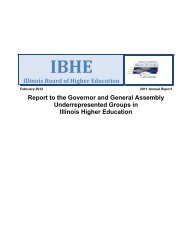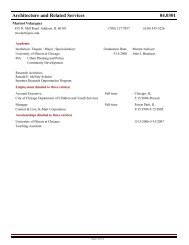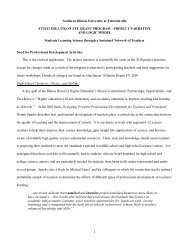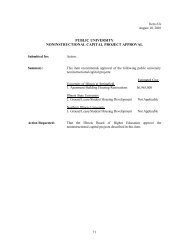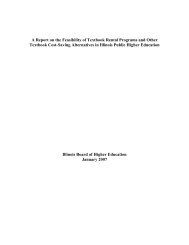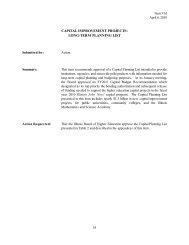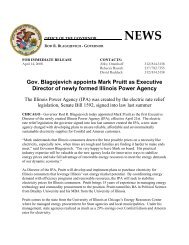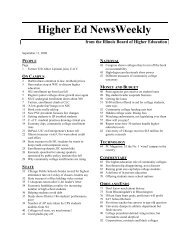Title of Effective Practice: - California Postsecondary Education ...
Title of Effective Practice: - California Postsecondary Education ...
Title of Effective Practice: - California Postsecondary Education ...
You also want an ePaper? Increase the reach of your titles
YUMPU automatically turns print PDFs into web optimized ePapers that Google loves.
Direct Connection to Policy Area 6 <strong>of</strong> The Illinois Commitment<br />
Alignment <strong>of</strong> Strategic Planning with AQIP<br />
Heartland Community College<br />
What issue or need is addressed by the effective practice?<br />
The current cycle <strong>of</strong> strategic planning is concluding, presenting the opportunity to revise HCC’s Strategic<br />
Planning process to coordinate with its recent acceptance into the AQIP accreditation system. At the same time,<br />
the opportunity to develop a more meaningful internal program review process is afforded by the revisions in<br />
program review at the state level. College administration desired a more comprehensive but streamlined<br />
planning model that incorporated performance measures and aligned with both statewide and accreditation<br />
requirements. These factors lead to the development <strong>of</strong> this new model.<br />
Description <strong>of</strong> the effective practice:<br />
HCC’s new Strategic Planning and Institutional <strong>Effective</strong>ness model revolves around Five Key Questions:<br />
• Why are we here? (Institutional mission, statewide goals, broad purposes)<br />
• What are we trying to accomplish? (College-wide goals, both operational and strategic, including strategies<br />
for measuring processes and outcomes; alignment with AQIP Categories)<br />
• How are we doing? (Collection <strong>of</strong> performance indicator data)<br />
• What does it mean? (Comparison to available historical and peer data and analysis <strong>of</strong> external and internal<br />
factors impacting the College)<br />
• Where are we going? (Identification <strong>of</strong> areas in need <strong>of</strong> improvement and new initiatives)<br />
How does this practice achieve sustainability?<br />
The model is in its first few months <strong>of</strong> use, but is designed to be applicable not only at the highest level <strong>of</strong><br />
College planning but throughout the organization. The conceptual simplicity <strong>of</strong> this model has been well<br />
received and is adaptable to all levels <strong>of</strong> college operations. The model has been applied to the instructional<br />
program review process in response to the opportunity provided by ICCB’s statewide program review revisions<br />
and is being piloted by three programs for this year’s cycle. It is also being piloted internally by one noninstructional<br />
division as a model for evaluating departmental effectiveness. The five key questions can even be<br />
applied at the position or individual level as an alternative mechanism <strong>of</strong> personnel evaluation.<br />
What are the results/measurable outcomes?<br />
Widespread acceptance and usage <strong>of</strong> the model will indicate its applicability. It is also designed to coordinate<br />
with the budgeting process. If it happens as designed, it will have been successful.<br />
Contact Information<br />
Name: Dr. Dana Rosenberg<br />
Email: Dana.Rosenberg@Heartland.edu<br />
Phone: (309) 268-8181<br />
191


